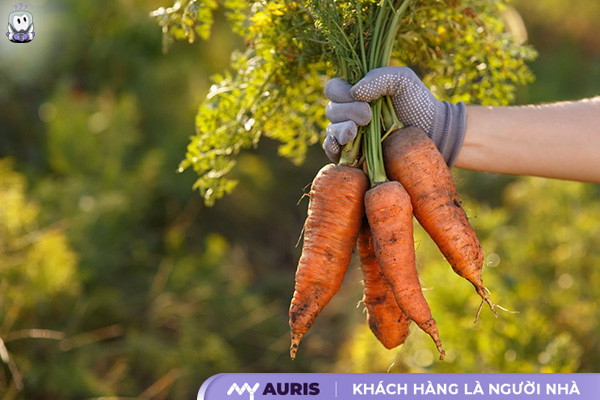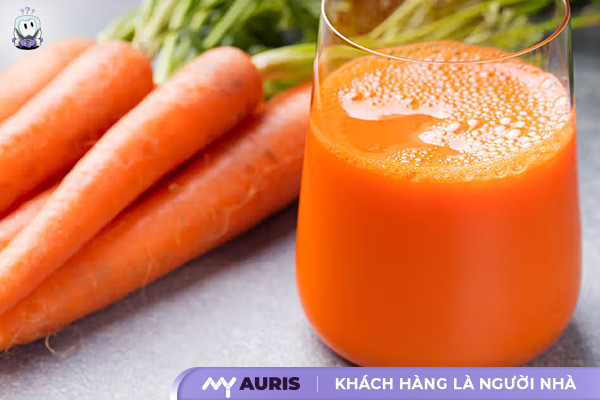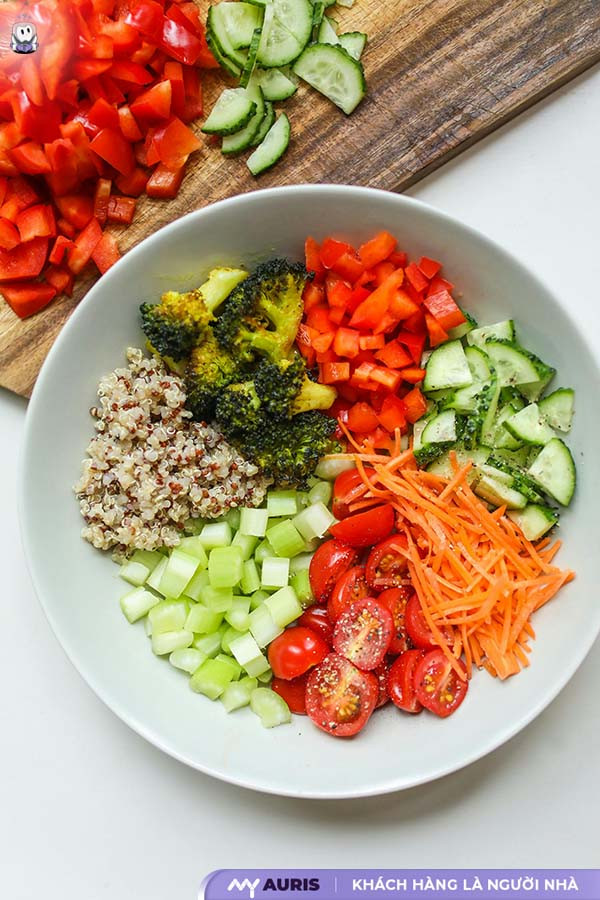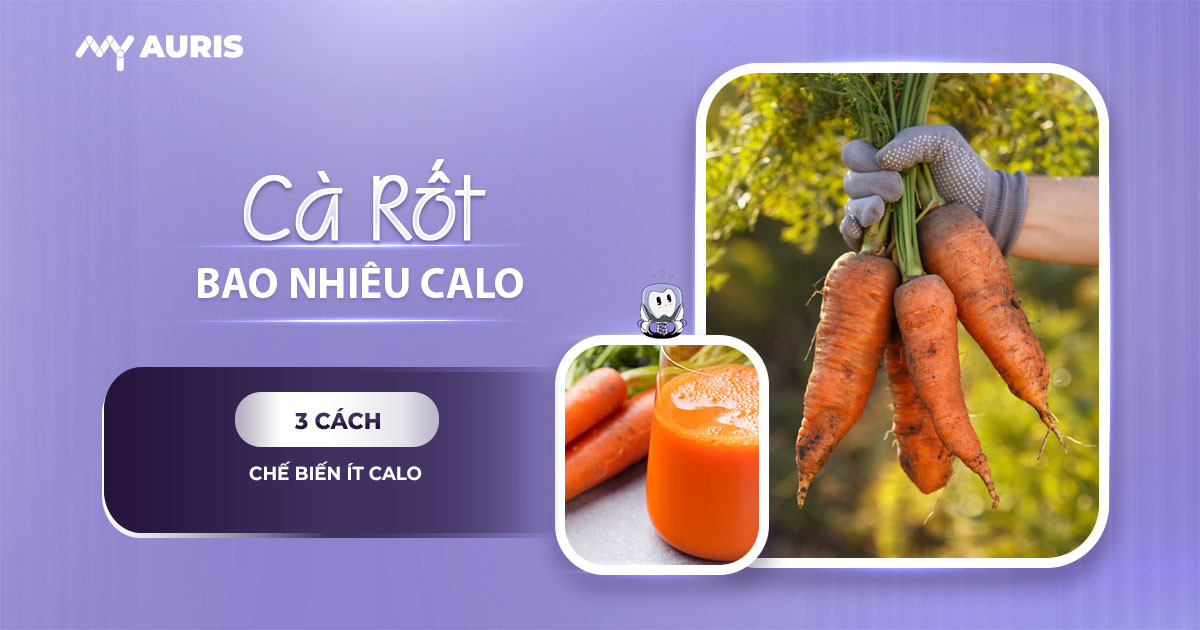Understanding the calorie content of natural foods like carrots is essential, especially for those who are losing weight, dieting, or need a balanced nutritional regimen. In this article, My Auris Dental Clinic specifically shares information about the calories in carrots, their nutritional value, and proper usage guidelines.
How many calories are in carrots?
If you’re wondering how many calories are in carrots, the answer is: 100g of carrots contains about 41.3 calories, of which 86% comes from carbohydrates, 9% from protein, and 5% from fat. With such a low-calorie content, carrots are an ideal low-calorie vegetable to include in your daily diet.
More specifically:
- 128g of chopped raw carrots contains approximately 52 calories.
- 156g of cooked carrot slices, boiled and drained, provides approximately 55 calories.
The special thing is that cooked carrots don’t significantly change their calorie content compared to raw carrots, as long as no additional ingredients are added during cooking. This helps you easily control your energy intake, even when preparing dishes.

Nutritional content of carrots
Many people wonder if this vegetable is nutritious enough for a diet or weight loss menu. The answer is yes, if you understand its specific components.
Nutritional composition table per 100g of carrots (raw)
| Component | Value | Unit |
| Energy (Calories) | 41 | kcal |
| Water | 88.3 | % |
| Protein | 0.93 | g |
| Fat | 0.24 | g |
| Carbohydrate (Total) | 9.58 | g |
| – Of which: Sugar | 4.74 | g |
| – Of which: Fiber | 2.8 | g |
| Vitamin A (RAE) | 835 | µg |
| Beta-carotene | 8285 | µg |
| Vitamin C | 5.9 | mg |
| Vitamin K1 | 13.2 | µg |
| Vitamin B6 | 0.138 | mg |
| Folate (B9) | 19 | µg |
| Potassium | 320 | mg |
| Calcium | 33 | mg |
| Magnesium | 12 | mg |
| Phosphorus | 35 | mg |
| Sodium | 69 | mg |
| Glycemic Index (GI) | ~35 | Low GI |

Do carrots make you fat?
100g of raw carrots contains about 41.3 calories. Compared to other natural foods and vegetables, this calorie level is quite low. This means you can eat a relatively large amount of carrots without excessively increasing your total daily calorie intake. This is an important factor for people managing their weight or following a diet.
Carrots have natural sugars, but their glycemic index (GI) is low to medium (approximately 35 – 49 when eaten raw). When boiled, the GI may increase slightly, but the total energy remains insignificant. As a result, carrots do not cause blood sugar spikes like fast food, fried foods, or high-calorie foods.
Firstly, carrots are rich in soluble fiber and beta-carotene, which help increase satiety, reduce cravings, and improve digestion. When eaten with meals, carrots can reduce the amount of other food you consume. This is an advantage compared to processed foods, which are low in fiber and high in saturated fat.
Secondly, carrots contain almost no fat. Their calorie content by volume is very low (only about 1/3 of the calories in sweet potatoes). Furthermore, this root vegetable is suitable for vegetarian diets, body detox, and belly fat reduction regimens.
Finally, the overall nutritional value in carrots is quite balanced: rich in vitamins A, C, K, potassium, and antioxidants. This helps maintain stable metabolism, limiting excess fat accumulation.

How to prepare carrots to maintain low calorie content
Here are scientific preparation methods to keep the calorie content of carrots low, which anyone can implement:
Eating raw or in salads
Raw carrots are the best way to maintain low calories. Simply wash, thinly peel, and cut into julienne strips or thin slices. They can be eaten with cucumber, cauliflower, or white radish in vegetable salads. Eating them raw preserves vitamin A and carotene, while also not increasing calorie count as no oil, salt, or sugar is used.
Steaming or lightly boiling
Steaming or quick boiling for 5-7 minutes helps carrots become tender while retaining their characteristic orange color, nutritional value, and low calorie count. During boiling, avoid adding salt or oil to prevent an increase in sodium and energy.
Instructions:
- Cut carrots into bite-sized pieces
- Boil water, then add carrots to steam or boil
- Do not overcook, as this can easily lead to a loss of vitamins and fiber
Avoid frying or stir-frying with oil
Many people use carrots to stir-fry with butter, meat, or cooking oil, which transforms a healthy food into fast food, a high-calorie food. Oil and fat, when combined with carrots, will increase the total calories by 2-3 times.
You can pan-fry them without oil or use an air fryer to make carrots lightly crispy without increasing unhealthy fats.
Combine with healthy ingredients
Carrots should be eaten with other weight-loss vegetables like pumpkin, cauliflower, and sweet potatoes (boiled). Avoid cooking them with coconut milk, peanuts, sugar, or processed foods. Ingredients high in sugar, oil, or with a high glycemic index will negate the weight-loss benefits of carrots.
You can use carrots in simple menus such as:
- Steamed carrots with sesame salt
- Carrot and cucumber salad with lemon dressing
- Fat-loss vegetable soup with carrots, cauliflower, white radish
- Sugar-free carrot smoothie (with apple and ginger)
These dishes not only keep calories low but also promote digestion, reduce hunger, and provide clean energy from nature.
Carrots are a common ingredient in many healthy dishes, but proper consumption is key to optimal health benefits. Understanding your body’s condition, nutritional needs, and current diet will help you use carrots safely and effectively. For in-depth advice, consult a nutritionist to personalize your meal plan.





